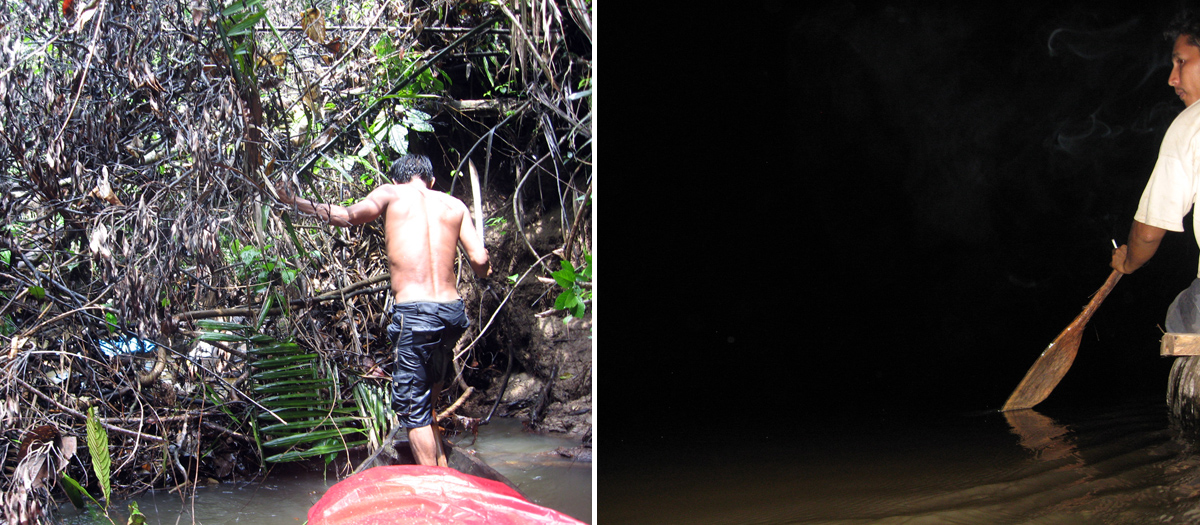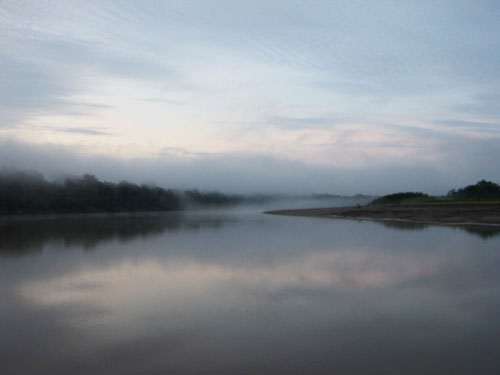
The expeditions are rugged. A typical day involves getting up early, rising with the sun, taking down and packing up camp, eating breakfast and setting out for the entire day by dugout canoe, or on foot.
If it’s a day of walking, it’s an entire day of walking — through deep jungle, across rivers, across log bridges, up hills, under trees, around swamps and mud, in the heat, in dense humidity, drinking from jungle rivers, going as fast as you can, carrying as much gear as you can.
Rests are taken of course, but each day it is essential to cover a certain distance and reach camp well before dark. Travel through the jungle at night is dangerous and is avoided.
Once a suitable camp is reached, a fire is started, some of the team may go fishing or hunting, tea and dinner is made, hammocks and mosquito nets are hung, you can wash, change and clean up a little bit, eat, relax, and share stories, and crawl into your hammock for well deserved sleep. And then — up early to do it all again.
The days in the canoe, on the rivers, are much less strenuous. However they are long days under the sun. Sometimes it’s very hot, sometimes it’s raining heavily.
If you are uncomfortable with these kinds of conditions or situations — heat, humidity, camping, wilderness, physical exertion — then you may want to reconsider.
However, if you are prepared for these kinds of conditions, if you have experience hiking, backcountry camping, “roughing it”, if you have endurance, and most importantly; if you have a positive mind and good energy — you might find yourself very rewarded.
What to Bring
Travel light
You’ll be carrying your clothes, gear, toiletries, camera, water bottle, water filter, hammock, mosquito net, blanket, and any personal items with you all day every day.
Hammocks, mosquito nets and blankets add a significant amount of weight. If need be, one of the team can carry some, if not all, of your items. They are there to help in this way if you need it. Typically though, you’ll be carrying as much as you can.
Pack only essentials.
Some items (clean clothes, small purchases, personal items, etc) can be left securely in Iquitos, at the home/office.
Backpack
A sturdy and good-sized backpack is essential. It should fit well and be comfortable. 8 hours or more (maybe much more) of walking with a heavy pack can be hard on your shoulders, your back, your entire body. Select the best backpack you can afford.
A backpack approximately 70L in size will work fine.
A raincover for your backpack is a good idea.
A small, lightweight daypack, hip-bag or handbag for camera, batteries, wallet, keeping small items close at hand, etc.
Boots
Rubber boots are provided. These are the typical jungle footwear for the vast majority of people in the Amazon. On these expeditions your feet will see a lot of mud and water, and rubber boots are preferred to best deal with this. If your boots get wet, it can be very difficult to dry them out, and you might spend a day or more sloshing around in wet boots. This is no fun at all, and is in fact a hazard as infection may occur.
However some people may prefer to use hiking boots instead. You may find hiking boots offer more support in general, better ankle support specifically, better footing and better grip than do rubber boots.
The trade-off is when you get wet, and you will, rubber boots will keep you nice and dry, whereas your hiking boots, socks and feet could become awfully soggy.
The decision is yours.
If you opt for hiking boots, ensure they fit properly, are well broken in, go above the ankle, and are as water-proof as possible.
Rubber boots will always be available for you on the expedition. Even if you decide not to use them during the walks, you’ll need them at camp for bathing and walking around, as well as for the days in the canoes.
You will also need basic walking around shoes or boots for Iquitos, etc.
Clothes
Even for longer expeditions you can get by with minimal amounts clothing.
Generally you should have changes of day clothing and evening clothing. Something to get sweaty, muddy and dirty in — something dry to change into in the evening and, if need be, something to sleep in.
Suggestions:
1 pair of lightweight hiking pants (suitable for wet, dirty, sweaty, muddy conditions).
1 pair of lightweight, preferably dry-wicking pants for when you reach camp, possibly also to sleep in.
Denim jeans are not recommended as they are heavy and do not dry quickly.
1 pair of swimming shorts. When you bathe in the rivers on the expedition you will not be swimming in the rivers, it is simply too unpredictable as to what might be waiting for you in the river. Swimming attire is essential, but you bathe cautiously on the riverbank while using a cup scoop and pour water and to rinse. There’s beautiful stretches of the Aucayacu River to swim in near the Aucayacy Camp.
1 lightweight travel towel.
Socks & underwear; lightweight, dry wicking. Enough to keep you happy.
1 light t-shirt for hiking
1 longsleeve shirt for evening. Longsleeves will help deal with mosquitos and other insects.
1 lightweight jacket suitable for rain, and for the overnight riverboat rides. It is hot in the jungle, but in the evening and especially on the riverboats at night, it can get chilly.
A hat or a headband can be helpful if you’re sensitive to sun, or to keep sweat from dripping in your eyes.
Lightweight sandals or flip-flops
Accesories
Flashlight and/or an LED headlamp.
Mosquito/insect repellant with DEET, also natural repellants.
First Aid kit – alcohol pads, band-aids, antibiotics, etc
Camera.
Enough batteries.
Plastic sealable bags (protect your camera and other items from getting wet).
Soap – preferably natural & biodegradable.
Shampoo – a small bottle, preferably natural & biodegradable.
Travel size toothpaste – preferably natural & biodegradable.
Toothbrush.
A small folding knife.
BIC lighters. (Lighters in Iquitos are most often poor quality).
Sunscreen.
String, twine – handy for fixing a broken shoelace, broken strap, etc.
Food
All food is provided on the expeditions, and it’s delicious.
La comida es deliciosa!
On expeditions, the food is basic jungle cuisine; rice, pasta, lentils, chonta palm, vegetables, fruits, farina, fish, jungle birds and so forth.
Vegan or Vegetarian diets can be and have been accommodated.
If you have any special dietary requirements, please let us know.
Whatever your dietary needs, you might enjoy bringing small lightweight snacks, like nuts, seeds, dried fruit, etc.
–
Meals are not provided in Iquitos, however Iquitos has an amazing array of restaurants, street vendors and of course the wild & wonderful Belen Market.
La Noche Resaurante, situated on The Boulevard overlooking the River and away from busy streets. Offers a wide mix of Peruvian cuisine, and some Peruvian-Western options, all made fresh. Try all the juices!
Water
In Iquitos bottled water is readily available.
Bottled water is available and provided on the overnight riverboats, and at the Aucayacu Camp.
When you set out on an expedition, you’ll begin with whatever bottled water you can carry, but it will go quickly, and afterwards you’ll drink filtered and purified river water.
A water filter is available from the team, however you may feel more comfortable with your own water filter/purifier system.
Do your research, there are many types of purification and filtration systems on the market. Amazonian river water contains a lot of sediment, and often needs to be filtered before it can be purified.
Suggestions:
Basic water filter (to remove sediment, preferably a small, lightweight unit)
Extensive testing has proven SteriPEN to be safe and effective, eliminating over 99.9% of bacteria, viruses and protozoa that cause water-borne illness. SteriPEN has earned the Water Quality Association’s Gold Seal, certifying its effectiveness.
Iodine, Chlorine or other water treatment tablets.
Ensure your water filtration and purification system is in good working order before you leave for Peru!
If all else fails you can always boil water to purify and drink.
However, it can be a lengthy process to boil enough water (after dinner), let it cool overnight (covered to keep out bugs) and then pour it all into your bottle in the morning.
Grapefruit Seed Extract – If you do get sick from the water, grapefruit seed extract is good remedy for giardia or other intestinal issues. A $20 bottle could last you for a couple years. It’s antifungal, anitviral, anitbacterial and very handy.
Probiotics (a variety that does not require refrigeration) can be a big help if intestinal issues arise. Good quality probiotics can be used also for prevantative measures before, and during, your travel.
Vaccinations
Please do your research and make an informed decision regarding vaccinations.
Languages
It is not necessary to be fluent in Spanish, however even a little bit basic Spanish will make your journey more enjoyable and expansive. A Spanish-English dictionary is recommended as are basic Spanish lessons.
Ruber speaks Spanish, English and French.
Hotels
There are numerous hotels in Iquitos to fit most any budget.
Some examples are:
–
Hotel Marañon
Address: Nauta 285
–
Hotel la Casona
Jirón Fitzcarrald 147
–
Flights
Book your international flight to Lima, Peru – and then a domestic flight from Lima to Iquitos.
–
If you have any questions please contact us.

